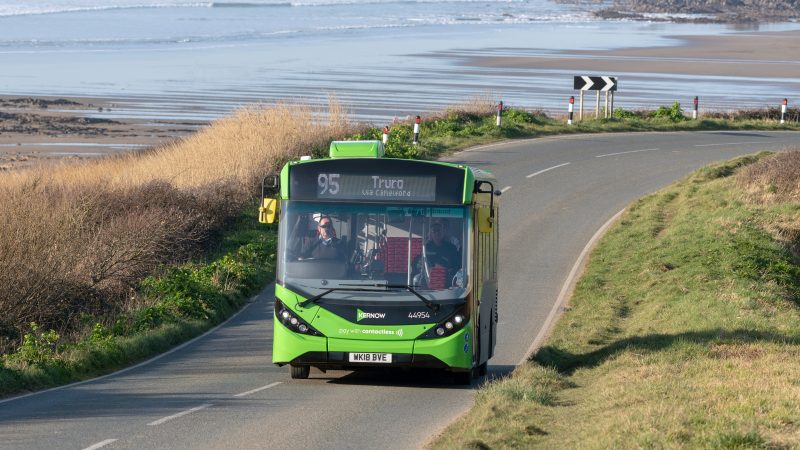
The Tories’ recent £2 bus fare cap was billed as a helping hand with cost-of-living pressures. But it’s more than that. It’s an admission that transport inequalities between our major cities and our towns, villages and rural areas are at breaking point.
A public transport system that is reliable, affordable and green should be a basic right. But it isn’t, and in our coastal towns and villages, it is all too often unreliable, expensive and dirty. People who rely on public transport – mainly buses – in these areas do not understand why their services aren’t as reliable as those in major cities. They ask why their buses are all diesel-powered, while big city buses are green.
One way forward is a policy of guaranteed minimum standards in public services or a “minimum infrastructure guarantee” as suggested in the report of the Commission on the UK’s Future led by Gordon Brown. A transformational idea lies within this unexciting name: minimum standards for every citizen, no matter where they live, on transport, communications networks and local amenities. One of the report’s flagship proposals is to devolve powers away from Westminster. A minimum infrastructure guarantee, alongside other citizens’ “rights”, would ensure that local politicians, with their newly devolved powers, could not erode the basic, non-negotiable elements of our communities and the local economy, as the Tories have done.
Minimum standards on public transport in particular would be revolutionary, especially for coastal towns, whose residents feel ignored by Westminster and believe that they are worse off compared to other areas. Recent Fabian Society polling found that, on eight out of 13 issues, more people in coastal towns thought their area was worse off than other areas: on the availability of public transport, the affordability of public transport, access to good shops and amenities, opportunities for young people and the amount of public funding spent, among others. More respondents in coastal town constituencies felt that their local area was not supported “by the government to reduce emissions and adapt to the effects of climate change” than who did.
Having lived in the coastal town of Folkestone, Kent for almost a decade, the Fabian Society polling reflects my experiences of the situation on the ground. A single bus fare from one end of town to the other – around three miles – is about £5. Buses, all diesel, are regularly cancelled for spurious reasons. Rising housing costs mean that many people have to commute into town from surrounding areas to work, shop and see family and friends. GP surgery closures – driven by a long-standing coastal recruitment crisis – have forced patients to travel further to get medical care. Car ownership is essentially forced; living without one can mean longer waits, longer days, more pain, more expense, less enjoyment of life and less hope for the future. Green transport is a pipe dream when the County Council can’t even deliver a reliable and affordable bus service. So people stick with their petrol cars, seeing no realistic alternative, or are forced to use whatever bus service is available.
It is extremely difficult for a private citizen to hold bus companies accountable or to stop the County Council cutting subsidised routes. The only ‘stick’ is legal action, but this is expensive, risky and difficult. County councils have wide powers to decide what are “appropriate” public transport services, under the Transport Act 1985, and the courts shy away from overriding politicians’ decisions on how budgets are spent.
What are minimum service levels for public transport? This would have to be worked out (the idea is discussed further here), but could include specified routes or criteria that ensure that coastal towns and rural communities stay connected.
In his new years’ speech earlier this month, Keir Starmer enthusiastically and rightly embraced the principle of devolution of powers – including on transport – to the appropriate local level within England. But since coastal towns are not yet natural Labour territory (the Fabian Society polling explains this), a national commitment to guaranteeing minimum bus services at a local level – transport ‘red lines’ – would ensure that devolution does not allow future Tory county and district councils to undo Labour’s work. Critically, it would show that Labour is serious about tackling one of the key concerns in coastal towns and rural communities. Minimum bus services would be part and parcel of local economic plans, which would ultimately pay for those services.
Transport isn’t sexy; buses even less so. But poor public transport hits the most deprived areas and those in lower paid work the hardest, and it leaves its users feeling – quite literally – left behind. As the Fabian Society polling stresses, this is the key concern that Labour needs to address at the next general election – and in government. For many, this feeling is hard to separate from apathy with the political class. A pledge on national minimum standards in public transport would be a hyper-local way of helping Labour fight this despondency about politics. More broadly, it would help cement a positive sense of place, help local authorities reach net zero and lock in improvements to local economies and communities for generations to come.




More from LabourList
‘The cost of living crisis is still Britain’s defining political challenge’
‘Nurses are finally getting the recognition they deserve’
Letters to the Editor – week ending 15th February 2026